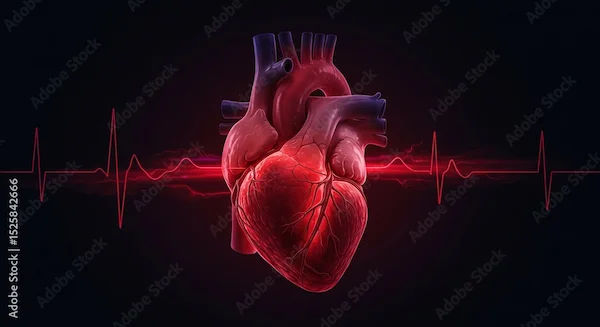Intermittent Fasting and Heart Disease
Explore the effects of intermittent fasting on heart health, including its potential to lower blood pressure, improve cholesterol levels, reduce inflammation, and support overall cardiovascular wellness.

Written by Dr Sonia Bhatt
Last updated on 3rd Jul, 2025
Intermittent fasting involves alternating between periods of eating and fasting according to a specific schedule. Unlike traditional diets that focus on what you consume, this approach emphasises when you eat. There are various methods to practice intermittent fasting, such as limiting your eating to an eight-hour window each day or consuming only one meal a day on select days of the week. As this eating pattern gains popularity, researchers are exploring its potential effects on heart health. Studies are examining how it affects your risk of developing heart disease—a term encompassing conditions that affect the heart's structure and function. Continue reading to learn more about the connection between intermittent fasting and heart disease.
Types of Intermittent Fasting
There are several popular methods of intermittent fasting, each with unique schedules and guidelines:
- Alternate-day Fasting: This method alternates between regular eating days and fasting days, during which you either abstain from food entirely or consume a small meal (under 500 calories). For example, you might eat regularly on Monday, Wednesday, and Friday, and limit yourself to one meal on Tuesday, Thursday, and Saturday.
- 5:2 Fasting: In this approach, you eat a normal diet five days a week and either don’t eat at all or restrict yourself to a single meal of 500–600 calories on two non-consecutive days. A typical example would be eating regularly every day except Monday and Thursday, which would be your calorie-restricted days.
- Daily Time-restricted Eating: This method involves eating all your meals within a six to eight-hour window each day and fasting for the remaining hours. A common version of this is the 16/8 fasting method, where you fast for 16 hours and eat during an eight-hour period. Some people skip breakfast, while others prefer to skip dinner or eat earlier in the day.
Scientific Links between Intermittent Fasting and Heart Health
There are several ways in which intermittent fasting affects your heart health.
Impact on Blood Pressure
Hypertension, or high blood pressure, is a major global health concern and a significant risk factor for heart disease. Intermittent fasting has shown potential in reducing blood pressure through various mechanisms, though research is ongoing to fully understand the process. One key factor is calorie restriction. Fasting often leads to a reduction in overall calorie consumption, which has been linked to decreased blood pressure levels.
Additionally, fasting appears to influence the nervous system by promoting a state of parasympathetic dominance, characterised by relaxation, as opposed to the sympathetic state associated with heightened blood pressure. The gut microbiome may also play a role. The diverse bacteria within the gastrointestinal system can impact processes such as digestion and immune responses, potentially contributing to changes in blood pressure during fasting. Lastly, weight loss and a reduction in water retention, both common effects of fasting, may further help lower blood pressure.
Effects on Cholesterol Levels
Cholesterol levels play a crucial role in heart health, with low HDL cholesterol and high LDL cholesterol and triglycerides being major risk factors for heart disease. Research exploring the effects of intermittent fasting on cholesterol levels have shown promising outcomes. Research conducted on both animals and humans indicates that intermittent fasting may lead to favorable shifts in cholesterol profiles. It has the potential to lower total cholesterol, reduce triglycerides and LDL (often referred to as "bad" cholesterol), and enhance HDL (known as "good" cholesterol). While further studies are needed, these findings highlight the potential benefits of intermittent fasting for managing cholesterol and supporting heart health.
Influence on Inflammation and Oxidative Stress
Oxidative stress arises from an imbalance between free radicals and antioxidants in the body, often triggered by various factors. This imbalance can result in chronic inflammation, which is a significant contributor to conditions such as heart disease. Research indicates that intermittent fasting may help mitigate oxidative stress and lower inflammation levels in the body. By reducing these harmful processes, fasting could potentially decrease the likelihood of developing or exacerbating heart-related conditions.
Benefits of Intermittent Fasting on Heart Disease Risk Factors
Intermittent fasting has a positive effect of multiple risk factors of heart disease, such as:
Weight Loss and Obesity Management
Obesity, a chronic condition characterised by excessive body fat, is a significant risk factor for heart disease. Intermittent fasting has gained popularity as a strategy for weight loss and managing obesity. By reducing the number of meals consumed, fasting naturally leads to a lower calorie intake. It also influences hormone levels, aiding in weight reduction. Decreased insulin levels, elevated Human Growth Hormone (HGH), and increased norepinephrine work together to break down stored fat, making it easier for the body to utilise it as energy. Furthermore, short-term fasting can boost metabolism, enhancing calorie burning and supporting weight management efforts.
Insulin Sensitivity and Blood Sugar Control
Intermittent fasting has shown potential in enhancing blood sugar management by improving insulin sensitivity and reducing insulin resistance. This improvement leads to lower levels of fasting blood sugar and glycated hemoglobin (HbA1c). By addressing insulin resistance, fasting supports healthier blood sugar levels and reduces the risk of developing type 2 diabetes, a significant contributor to heart disease.
Consult Top Doctors For Heart Disease
Potential Risks and Considerations
While intermittent fasting provides many health benefits, it may cause temporary side effects, especially during the initial stages. Common issues include hunger, headaches, fatigue, nausea, and difficulty sleeping. These symptoms typically subside within a few weeks as the body adjusts. It's essential to remember that intermittent fasting may not suit everyone. If you experience persistent side effects, consult a healthcare professional. Certain individuals should avoid intermittent fasting altogether, including:
- Pregnant or breastfeeding women.
- Children and teenagers under 18.
- Those with a history of eating disorders.
- Individuals with type 1 diabetes who require insulin, as fasting might increase the risk of hypoglycemia during fasting periods.
Before starting intermittent fasting—or any diet—it’s advisable to seek guidance from a healthcare provider to ensure it’s appropriate for your health needs. For those who tolerate it well, intermittent fasting can be a sustainable, long-term lifestyle choice.
Intermittent Fasting Protocols for Heart Health
Starting intermittent fasting can be straightforward, with the 16/8 method often regarded as one of the easiest and most manageable approaches. It’s a practical way to ease into fasting and assess how your body responds. If this method suits you, you may explore more advanced fasting techniques or fast on an as-needed basis. For instance, skipping meals occasionally when you’re not hungry or when cooking is inconvenient can also yield benefits. A rigid schedule isn’t necessary; experimenting with different strategies can help you find a routine that fits your lifestyle.
During fasting periods, you can consume water or zero-calorie drinks like black coffee and tea. However, during eating windows, it's crucial to focus on balanced and nutritious meals. Overindulging in high-calorie, processed foods during these times can negate the benefits of fasting. For optimal health, prioritise leafy greens, lean proteins, healthy fats, and whole, unrefined carbohydrates like whole grains. This flexible yet mindful approach supports heart health while accommodating a range of food preferences.
Conclusion
Intermittent fasting presents a promising approach to improving heart health by addressing key risk factors such as weight management, cholesterol levels, blood sugar control, and inflammation. Its structured yet flexible eating patterns make it an accessible lifestyle choice for many. However, it’s essential to consider potential risks, especially for individuals with specific health conditions. Consulting with a healthcare provider before beginning intermittent fasting ensures its safety and effectiveness for your unique needs.
Consult Top Cardiologist
Consult Top Doctors For Heart Disease

Dr. Bhethala Sharan Prakash
General Physician/ Internal Medicine Specialist
5 Years • MBBS MD
Bengaluru
PRESTIGE SHANTHINIKETAN - SOCIETY CLINIC, Bengaluru

Dr. Dayanashre N
General Physician
3 Years • MBBS
Bengaluru
PRESTIGE SHANTHINIKETAN - SOCIETY CLINIC, Bengaluru

Dr. Sushith C
General Physician
2 Years • MBBS
Bengaluru
PRESTIGE SHANTHINIKETAN - SOCIETY CLINIC, Bengaluru

Dr. Anand Ravi
General Physician
2 Years • MBBS
Bengaluru
PRESTIGE SHANTHINIKETAN - SOCIETY CLINIC, Bengaluru

Dr. Sarita Rao
Cardiologist
17 Years • MBBS, DM (Cardiology)
Indore
Apollo Hospitals Vijay Nagar, Indore
Consult Top Cardiologist

Dr. Bhethala Sharan Prakash
General Physician/ Internal Medicine Specialist
5 Years • MBBS MD
Bengaluru
PRESTIGE SHANTHINIKETAN - SOCIETY CLINIC, Bengaluru

Dr. Dayanashre N
General Physician
3 Years • MBBS
Bengaluru
PRESTIGE SHANTHINIKETAN - SOCIETY CLINIC, Bengaluru

Dr. Sushith C
General Physician
2 Years • MBBS
Bengaluru
PRESTIGE SHANTHINIKETAN - SOCIETY CLINIC, Bengaluru

Dr. Anand Ravi
General Physician
2 Years • MBBS
Bengaluru
PRESTIGE SHANTHINIKETAN - SOCIETY CLINIC, Bengaluru

Dr. Sarita Rao
Cardiologist
17 Years • MBBS, DM (Cardiology)
Indore
Apollo Hospitals Vijay Nagar, Indore

